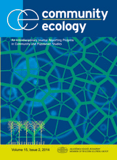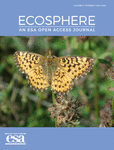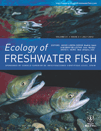
Food Webs
metrics 2024
Connecting ecology and evolution through innovative research.
Introduction
Food Webs is a peer-reviewed journal published by Elsevier, dedicated to advancing the understanding of ecological dynamics through the study of food webs. With an ISSN of 2352-2496, this journal provides a platform for novel research that bridges the fields of ecology, evolution, behavior, and systematics. The journal's impact in the academic community is reflected in its 2023 Q2 ranking in both Ecology and Ecology, Evolution, Behavior and Systematics, showcasing its relevance and influence across these interconnected fields. Although it does not offer open access, it remains accessible to a wide audience of researchers and professionals due to its affiliation with a reputable publisher. The Scopus rankings position Food Webs favorably, with significant placements in the ecologically relevant categories, thus highlighting its contribution to advancing our understanding of complex ecological relationships. With a commitment to evidence-based research and interdisciplinary collaboration, Food Webs aims to foster knowledge that informs both scientific understanding and practical conservation efforts.
Metrics 2024
 0.58
0.58 1.80
1.80 -
- 26
26Metrics History
Rank 2024
Scopus
IF (Web Of Science)
JCI (Web Of Science)
Quartile History
Similar Journals

COMMUNITY ECOLOGY
Connecting Research to Ecological SolutionsCOMMUNITY ECOLOGY is a distinguished journal published by Springer Heidelberg that focuses on the intricate dynamics of ecological interactions within communities. Established in 2000 and continuing robustly through to 2024, this journal aims to disseminate significant research findings that contribute to the understanding of ecological processes, species interactions, and community structures. With an ISSN of 1585-8553 and an E-ISSN of 1588-2756, the journal holds a commendable position in the academic sphere, reflected in its Q2 quartile rankings in the categories of Ecology and Ecology, Evolution, Behavior and Systematics. It boasts an impressive Scopus ranking within the 57th percentile for both Agricultural and Biological Sciences and Environmental Science fields, attesting to its relevance and influence. Though it does not currently operate under an open access model, COMMUNITY ECOLOGY remains a vital resource for researchers, professionals, and students eager to advance their knowledge in community ecology, highlighting the importance of collaborative research in addressing ecological challenges globally.

Journal of Fish and Wildlife Management
Uncovering sustainable practices for ecological health.The Journal of Fish and Wildlife Management, published by the U.S. Fish & Wildlife Service, serves as a vital resource for scholars, researchers, and professionals in the fields of Animal Science, Ecology, and Conservation Biology. With its ISSN 1944-687X, this esteemed journal has been disseminating critical research findings since 2010, contributing significantly to the understanding of fish and wildlife conservation practices and their ecological impacts. Despite its Q3 category rankings in various disciplines as of 2023, it provides a platform for innovative research that influences policy and management strategies for biodiversity conservation. The journal, although not open access, remains committed to advancing the scientific discourse surrounding wildlife management with articles that emphasize practical conservation efforts and ecological sustainability. Readers can expect a diverse range of articles that promote best practices in the management and conservation of fish and wildlife resources, furthering our collective mission of preserving ecological health and biodiversity for future generations.

ENVIRONMENTAL BIOLOGY OF FISHES
Illuminating the vital connections between fish and their habitats.ENVIRONMENTAL BIOLOGY OF FISHES, published by SPRINGER, is a premier journal in the fields of Aquatic Science and Ecology, Evolution, Behavior and Systematics. With a rich history spanning from 1976 to 2024, this esteemed journal provides a platform for groundbreaking research that addresses critical issues such as fish ecology, species behavior, and environmental influences on aquatic life. Recognized for its significant contributions, it holds a Q2 ranking in both the Aquatic Science and Ecology categories, reflecting its influence and relevancy in the academic community. The journal's focus on innovative ecological studies makes it an essential resource for researchers, professionals, and students dedicated to advancing our understanding of fish biology and the broader ecological systems of which they are a part. Although not an open-access publication, the insights and findings presented in its articles are invaluable for those engaged in the preservation and sustainable management of aquatic environments.

Ecosphere
Elevating the discourse in ecology and evolution.Ecosphere is a leading open-access journal published by WILEY, dedicated to advancing research in the fields of ecology, evolution, behavior, and systematics. Established in 2010 and headquartered in the United States, this innovative journal provides a platform for the exchange of cutting-edge scientific knowledge and discovery, fulfilling its mission to enhance our understanding of ecological systems and their interactions. With a prestigious impact factor reflecting its commitment to high-quality research, Ecosphere is ranked Q1 in both Ecology and Ecology, Evolution, Behavior, and Systematics for 2023, further solidifying its prominence in the scientific community. The journal's scope includes a wide array of topics related to environmental science, making it an essential resource for researchers, professionals, and students aiming to stay at the forefront of ecological research. It offers comprehensive open access options, ensuring that groundbreaking findings are readily available to a global audience, thus fostering collaboration and innovation in the field.

OIKOS
Pioneering research that shapes our understanding of nature.OIKOS is a leading journal dedicated to the field of Ecology, Evolution, Behavior, and Systematics, published by WILEY in the United Kingdom. Since its inception in 1973, OIKOS has established itself as a vital platform for researchers seeking to advance their understanding of ecological interactions and evolutionary processes, with its impact reflected in its prestigious Q1 classification in the 2023 Scopus rankings. The journal's dedication to high-quality research is exemplified by its robust ranking of #106 out of 721 in the relevant categories, situating it within the top 15% of journals globally. With a commitment to disseminating influential findings, OIKOS encourages the open exchange of ideas among a diverse range of scholars, making it an essential resource for academics, professionals, and students alike. Whether you are interested in innovative ecological theories or applied research with real-world implications, OIKOS provides a rich repository of knowledge to inform and inspire your work.

Nature Ecology & Evolution
Fostering transformative ideas for a sustainable future.Nature Ecology & Evolution is a premier journal that serves as a cornerstone for cutting-edge research in the dynamic fields of ecology, evolution, behavior, and systematics. Published by NATURE PORTFOLIO, this journal, with the ISSN 2397-334X, emphasizes high-quality, impactful studies that advance our understanding of ecological interactions and evolutionary processes. With an impressive Scopus ranking placing it in the 99th percentile—#6 out of 721 in Ecology, Evolution, Behavior and Systematics and #5 out of 461 in Environmental Science Ecology—it is classified as a Q1 journal, highlighting its significance in the research community. Established in 2016, it continues to foster an open dialogue among researchers and practitioners while facilitating the dissemination of transformative ideas that shape environmental policy and conservation strategies. While access to articles is restricted, the journal's robust impact factor underscores its relevance in scholarly discourse. Researchers, professionals, and students are encouraged to engage with the current trends and discoveries published in this leading journal, which thrives on addressing the challenges and complexities of our natural world.

WEB ECOLOGY
Illuminating the Pathways of Web-Driven EcosystemsWEB ECOLOGY is a premier academic journal published by COPERNICUS GESELLSCHAFT MBH, specializing in the field of Ecology, with a specific emphasis on the intricate interrelations between web-based ecosystems and environmental factors. Since its inception in 2000, this Open Access journal has provided an invaluable platform for researchers, professionals, and students to disseminate and access cutting-edge research findings. Currently based in Germany, WEB ECOLOGY has garnered a significant reputation, evidenced by its prestigious Q2 quartile ranking in both Ecology and Ecology, Evolution, Behavior and Systematics as of 2023. Furthermore, its impressive Scopus rankings, placing it within the top quartiles of its categories, highlight its relevance and influence in the field. With comprehensive coverage from 2000 to 2024, the journal aims to foster dialogue and innovation in ecological research, making significant contributions to our understanding of web ecology and inviting submissions that push the boundaries of current knowledge.

ECOLOGY OF FRESHWATER FISH
Illuminating the science of aquatic life.ECOLOGY OF FRESHWATER FISH is a premier academic journal dedicated to advancing the understanding of freshwater fish ecology, published by Wiley in Denmark. With an ISSN of 0906-6691 and an E-ISSN of 1600-0633, the journal has been a critical platform for researchers since its inception in 1992, and will continue through 2024. It holds an impressive Q2 ranking in multiple categories including Aquatic Science and Ecology according to the latest quartiles, reflecting its significance and impact in these fields. The journal is well-regarded with Scopus rankings placing it in the top percentiles for ecology-related disciplines, showcasing its contributions to the understanding of aquatic ecosystems. Although it does not offer open access, the journal is highly valued for its rigorous peer-review process and its commitment to publishing original research that informs policy and conservation efforts. By bridging the gap between theory and practice, ECOLOGY OF FRESHWATER FISH remains a vital resource for students, professionals, and researchers engaged in the study of freshwater environments.

Nature Conservation Research
Championing open access to vital conservation insights.Nature Conservation Research is a prominent open-access journal that has been dedicated to advancing the field of conservation science since its inception in 2016. Published by the SARANSK FOND PODDERZKI & RAZVITIA ZAPOVEDNYH in the Russian Federation, this journal serves as a vital platform for researchers, professionals, and students alike, providing critical insights into ecological and environmental issues. With an impressive impact factor and ranked in the second quartile across multiple categories—including Agricultural and Biological Sciences, Earth and Planetary Sciences, Ecology, and Nature and Landscape Conservation—Nature Conservation Research stands at the forefront of impactful scientific discourse. The journal not only aims to disseminate high-quality research findings but also seeks to foster collaboration and innovation in conservation practices globally. By ensuring open access to its content, it promotes widespread dissemination of knowledge, crucial in the fight against biodiversity loss and environmental degradation. Researchers and practitioners contributing to the journal will find themselves at the convergence of science and conservation efforts, paving the way for sustainable ecosystem management.

THALASSAS
Connecting Researchers to the Heart of Aquatic ScienceTHALASSAS is a prominent academic journal specializing in the fields of Aquatic Science and Oceanography, published by Springer International Publishing AG. Established in 2005 and running through 2024, this journal serves as a vital platform for sharing groundbreaking research and innovative findings related to the marine environment and its ecosystems. With an ISSN of 0212-5919 and an E-ISSN of 2366-1674, THALASSAS is indexed in Scopus and currently holds a Q3 classification in both Aquatic Science and Oceanography for 2023, reflecting its relevance and contribution to these scientific disciplines. Although it does not follow an Open Access model, THALASSAS offers valuable insights for researchers, professionals, and students interested in sustainable ocean management and aquatic biodiversity. Its rigorous peer-review process ensures that published articles meet the highest standards of academic quality, fostering a deeper understanding of marine sciences and addressing critical issues facing aquatic systems today.